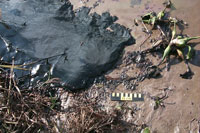
blogs.abcnews.com
while this image is posted on the ABC new site, it's not attributed.
Some mornings I come across an article so good I just want to post it -- offer it up or pretend I wrote it and that I am a reporter for the New York Times instead of a poet with a research project... today is one of those mornings. I even found an article in the London Telegraph which does just (pretends it wrote it) (funnily enough, I found the article after I wrote that first sentence...). ((It's worth noting here that this article is an Associated Press article -- it's stellar reporting, quotes and depth are offered entirely un-bilined. When people begin to get down on the media, they should please remember the amazing work that our reporters do everyday -- not for credit or glamor, but for belief in the job and for public service.))
To start, I didn't know how huge the LA oil industry is (remember, it's my responsibility to be entirely shameless here...)
In oil's heyday 30 years ago, Louisiana's coastal wells pumped 360 million barrels a year, an eighth of what Saudi Arabia ships to the market today.
I didn't know the marsh lands of Louisiana provide natural protection from Hurricanes -- and have been decimated -- in at least some large part by the state's oil industry. Swamp erosion, toxic waste and rerouting of water have all lead to completely overturning the nature of the region.
R. Eugene Turner, an LSU oceanographer, has calculated that every square mile of the delta is bounded on three sides by oil-canal ridges. Turner has spent more than 30 years studying the oil industry's footprint on the delta.
''If the water is blocked from going in, the wetlands on other side is drier for a little longer and also stays flooded longer than it otherwise would be,'' Turner said. ''By drying it, the land oxidizes and dries out; and if it's wetter, it's like leaving a lawn sprinkler on and the plants are going to die.''
I'm thinking, too, about that "oil-rich" distinction which is spreading like wildfire through the news these days ... What if every time there were reporting on LA -- or every time there had been reporting on Katrina it had been preceded by that adjectival clause?This from a times article from 2005 -- DOCTORED
The Gulf Coast has always been vulnerable to coastal storms, but over the years people have made things worse, particularly in the oil-rich state of Louisiana, where Hurricane Katrina struck yesterday.
Since the 18th century, when French colonial administrators required land claimants to establish ownership by building levees along bayous, streams and rivers, people have been trying to dominate the region's oil-rich landscape and the forces of its nature.
There's a whole site dedicated to "protecting Louisiana's Citizens and Environment from the Effects of Oil Spills."

If you see spilled oil, the law requires you to make two (toll-free) calls:
(1) Call the 24-hour Louisiana Emergency Hazardous Materials Hotline at (877) 925-6595
(2) Call the National Response Center (NRC) at (800) 424-8802
I keep trying to imagine sentences from the web site substituted for Boston or finished with "in Boston" like that kid's game where you finish movie titles with the phrase "in bed..."
· Minimize unauthorized discharges of oil in Boston
· Provide for an effective spill response in Boston
· Compensate the public for damages to the state’s natural resources in Boston
· Assist the public through education, service, and public outreach in Boston
None of that would ever be an issue. We don't have the resources. We also have a lot of power up here, inside of all these brick buildings... for crying out loud one of our countries best senators is standing in the way of wind energy to protect his family's view of the Cape Cod coast!
Money, Power. "Who Owns The Oil." Not the people living in the toxic waste areas -- not in Nigeria and not here. There seems to be no end to the proof of the devastation people cause by their greed and plundering of the earth.









No comments:
Post a Comment